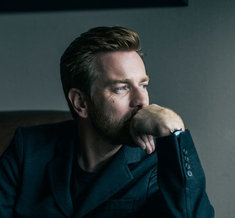This article appeared in the Dec. 5 issue of AwardsLine.
Ewan McGregor has played a lot of different kinds of roles since he first rose to prominence in 1996’s Trainspotting, but there’s one that has eluded his grasp: parenthood. In the December release The Impossible, the real-life father of four plays a man whose family is torn apart by the 2004 Indian Ocean tsunami. He struggles to keep his two young sons safe amidst the chaos while searching feverishly for his wife, played by Naomi Watts, and eldest son, played by Tom Holland. Though it’s the third film he’s appeared in this year after Haywire and Salmon Fishing in the Yemen, McGregor doesn’t take much time off. He recently spoke with AwardsLine from the set of August: Osage County, which is currently shooting in Bartlesville, OK.
AWARDSLINE: How did you first hear about The Impossible?
EWAN MCGREGOR: I heard about it through my agent, and I knew about J.A. Bayona and his film The Orphanage, although I don’t think I’d seen it until I’d read the script for The Impossible. I knew Naomi was attached—I’ve worked with Naomi before—and, yes, after reading the script I was left with no doubt. I didn’t know at the time that it was a true story, but there was something very honest and true about the writing. Another one of the main draws for me was that it was the first time in my career that I explored parenthood, although I’ve been a dad for a long time. I must’ve had some kids in films before, but not many, and I’ve never made a film that’s really about that relationship between you and your kids.
AWARDSLINE: How did the script read to you? There’s not a lot of dialogue, so I’m wondering what it was like going through the script the first time.
MCGREGOR: It had a very strong structure. It could have been written in a much more chaotic way—we fly back and forth and back and forth between all of the family’s experiences. I thought it even played against the chaos. (The structure) also started building up the tension about if they were going to find each other. I didn’t feel like it was spare of dialogue. Really good writers don’t feel the need to explain everything with lots of dialogue, I find.
AWARDSLINE: Were you able to spend any time with Maria Belon’s husband, your character in the film, before you started shooting?
MCGREGOR: I spoke to him on the telephone while I was shooting Salmon Fishing in the Yemen, a few days before I was due in Thailand, so I didn’t get a chance to meet him (before shooting). It’s a funny thing—the real family is Spanish, and because we weren’t playing them as Spanish, I felt like I was sort of free to create him. The whole family came out to visit the set, and when I met him, I thought, Oh, I’m not too far away. It was the writing I guess. The path through the film for me is that he really holds it together, he doesn’t allow himself to collapse until the bus station scene where he does allow himself the luxury to fall apart for a minute.
AWARDSLINE: Did you do any other research for the role?
MCGREGOR: We worked from an amazing documentary Channel 4 in Britain made called Tsunami: Caught on Camera, which was made using all the footage from (tourists’) cameras intercut with interviews with six or seven people who were there. It’s brutal and it’s devastating, and I watched it only twice, no, three times. I tried to go back to it, and I couldn’t. The art department had a great deal of research—photographs of hospitals and coastline shots, hotels, and then of the temples where the bodies were taken. There just reached a point once we started filming that—I mean, we’re spending all day trying to re-create this tragic event, and then we’re surrounded by a Thai crew, most of whom were affected by it and lost people there. All the hotels that we were staying in had been hit by the tsunami, so you’d be in bed at night thinking, Well, who was in this room and did they survive? I would concentrate on getting it right at work, but I couldn’t plunge myself into the horror of it because you can’t sustain that.
AWARDSLINE: You spend most of your time on screen with Oaklee Pendergast and Samuel Joslin, the young actors who play your sons in the film. How were they to work with?
MCGREGOR: They were just absolutely brilliant little guys, and I was always very careful with them. They had a child minder who was also a drama teacher for them, so he would prepare them for the scenes they were going to play, but I’m always very wary of how children are dealt with on movie sets. I said right up front that I wouldn’t involve them in anything that would actually frighten them or play any games with them just to get a desired effect on camera. So we worked quite hard with them. In some of the scenes where we had to huddle and cry—that doesn’t just happen on its own accord. We worked on that, I remember, for about a week or maybe more before we started shooting. And then when we did shoot, they were told quite clearly that when we were was on set, I was their dad. They knew I was their pretend dad, but still whenever I’d arrive on set, they’d run up and go, “Dad! Dad!” I’d send pictures back home to my kids: “Here’s my other family, my secret family in Thailand.” (Laughs.)

